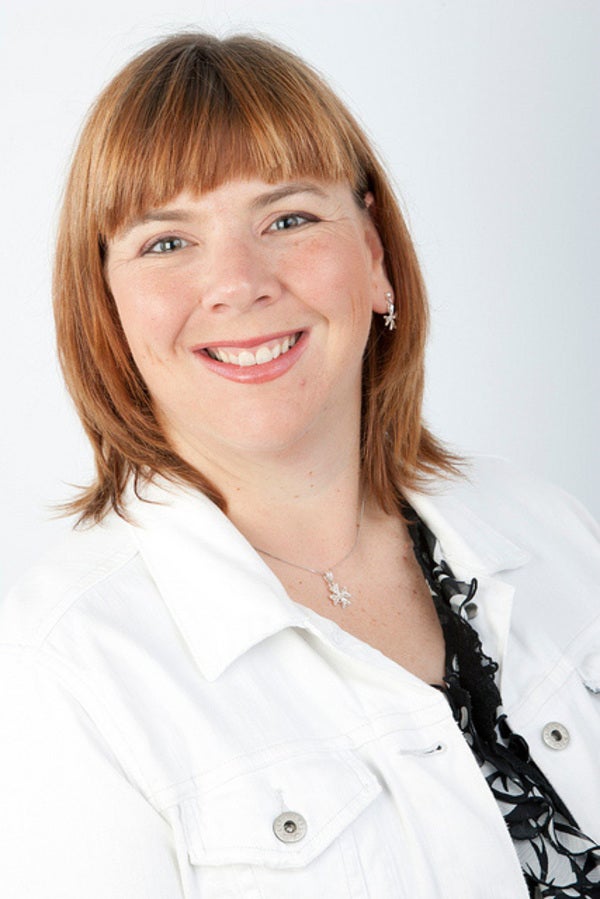Olga Michels

Chemistry Department Head
Biography
Education: Ph.D., Physical Organic Chemistry, University of Victoria; B.Sc., Chemistry and Mathematics, McMaster University
I am a physical organic chemist with a love for teaching and exploring, and Luther is a perfect place to pursue my passions! I have taught organic chemistry (and other courses) at Luther College since 2003. My research program is in the area of photochemistry (interested in what happens when you use light to activate molecules); with a special interests in host-guest photochemistry that is relevant to health and environmental questions.
Recently I have also become involved with Luther’s centre for global learning having been the faculty leader on the 2012 Spring Malta and the Mediterranean semester abroad experience. Studying abroad is a unique and life altering opportunity that I would like to share with many more students in the future!
Outside of Luther, I enjoy getting involved in numerous aspects of Decorah life. You will find me out on the tennis courts when the weather is good, and also on the stage (or directing) at the local community theatre, New Minowa Players. I hale from Canada, so students also enjoy my sometimes interesting pronunciation of words, and my love of all things Canadian (especially the Canadian hockey team in international competition . . . sorry)!
CHEM 141 A: Essentials of Chemistry
A one-semester general chemistry class for students who require or wish to take just one semester of college chemistry with a laboratory component. Topics will be chosen from the Chemical Principles sequence (Chemistry 151-152) and laboratories will introduce students to basic chemistry lab skills and techniques. This course is not intended for students going on in chemistry or biology.
CHEM 241 B: Organic Chemistry I
The first of a two-course sequence that examines the structure and reactivity of compounds containing carbon. Topics include bonding, nomenclature, conformations, stereochemistry, and organic acid/base chemistry. An introduction to reaction mechanism and reaction pathways is achieved through the study of the reactivity of aliphatic hydrocarbons. Spectroscopic identification of organic molecules by IR and NMR spectroscopy is also examined in detail. Three lectures per week, one three-hour lab a week.
CHEM 242 B: Organic Chemistry II
The second of a two-course sequence that examines the structure and reactivity of compounds containing carbon. Topics include the reactivity of aromatic hydrocarbons and molecules containing the carbonyl functional group; parallels between the behavior of these compounds and biomolecules are illustrated. Emphasis is placed on reaction mechanisms and the design of multi-step organic syntheses. Three lectures per week, one three-hour lab per week.
HONR 130 A: Scholars Colloquium
This is a discussion-based course that provides small-group discussions of readings, local or national current events or issues, and cultural and intellectual events available on campus. These events may include lectures (by Luther faculty members and visiting scholars and dignitaries), concerts (ranging from classical to jazz to contemporary), theater and dance performances, films, poetry readings, and art shows.
CHEM 151 A: Chemical Principles I
General course intended primarily for students concentrating in the science area. Algebra skills are assumed.
- Postdoctoral Research Associate, National Research Council of Canada, 2002-2003
- Ph.D., Physical Organic Chemistry, University of Victoria, 2002 Thesis: “Complexation of probe molecules to the different binding sites of bile salt aggregates”
- B.Sc., Chemistry and Mathematics, McMaster University, 1997 Thesis: “Study on a membrane based pH valve”
The Michels research group looks at host-guest photochemistry using primarily fluorescence spectroscopy. We’re interested in studying compounds (guests) complexed within a supramolecular structure of interest (host), when they are excited by light. Currently we are interested in studying environmental pollutants such as furans and polychlorinated biphenyls (PCBs) as our guest molecules. We are looking at how they interact with 3 different host systems: micelles, cyclodextrins (CD) and DNA. In the preliminary study, we are interested in two questions: 1) Can we detect the environmental pollutants at very low concentrations using fluorescence spectroscopy and 2) Does the rigidity of the host effect the ability of the guest to bind (micelles are the least rigid, and DNA the most rigid). After these initial questions have been addressed we hope to continue the work by looking at the potential harmful effects of the pollutants being bound to DNA; specifically when the pollutant absorbs light while in the presence of DNA, does it damage the DNA.
- Holme, T. A., MacKellar, J., Constable, D.J., Michels, O.R., Trate, J.M., Raker, J.R., Murphy, K.L. Adapting the Anchoring Concepts Content Map (ACCM) of ACS Exams by Incorporating at Theme: Merging Green Chemistry and Organic Chemistry. Journal of Chemical Education, 2020, 97, 2, 374-382.
- Rinco, O., Brenton, J., Douglas, A., Hannemann, A., Henderson, M., Indrelie, K., Wessels, J., Widin, J. A fluorescence study: looking at the effect of porphyrin structure on binding to human serum albumin. Journal of Photochemistry and Photobiology A: Chemistry, 2009, 208, 91-96.
- O’Connell, R.J., Yuan, C., Johnston, L.J., Rinco, O., Probodh, l, Treistman, S.N. Gating and Conductance Changes in BKCa Channels in Bilayers Are Reciprocal. J. Membrane Biol., 2006, 213, 143-153.
- Chen, L., Rinco, O., Popov, J., Vuong, N., Johnston, L.J. Psoralen and Coumarin Photochemistry in HSA Complexes and DMPC Vesicles. Photochemistry and Photobiology, 2006, 82, 31-37.
- Mladenova, G., Singh, G., Acton, A., Chen, L., Rinco, O., Johnston, L.J., Lee-Ruff, E. Photochemical Pinacol Rearrangements of Unsymmetrical Diols. Journal of Organic Chemistry. 2004, 69, 2017-2023.
- Rinco, O., Nolet, M.-C., Ovans, R., Bohne, C. Probing the Binding Dynamics to Sodium Cholate Aggregates Using Naphthalene Derivatives as Guests. Photochemical and Photobiological Sciences. 2003, 2, 1140-1151.
- Rinco, O., Kleinman, M.K., Bohne, C. Reactivity of Benzophenones in the Different Binding Sites of Sodium Cholate Aggregates. Langmuir. 2001, 17, 5781-5790.